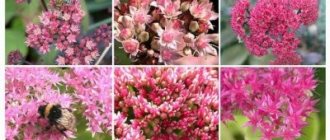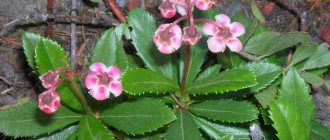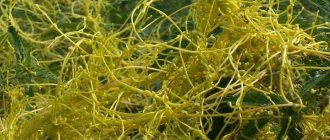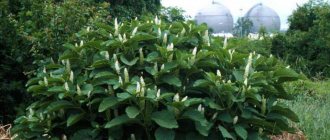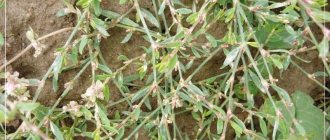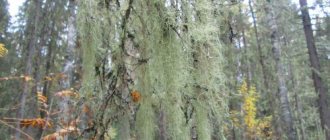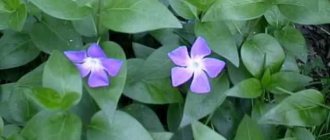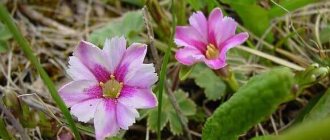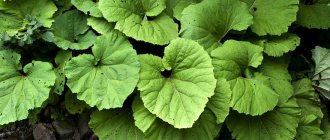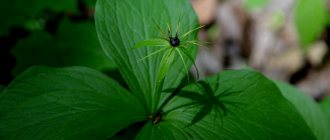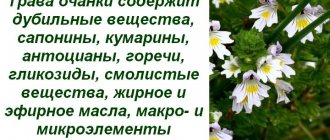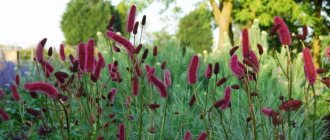Monarda, or garden bergamot, is a spicy and aromatic plant that has unique beneficial properties: it is not only a beautiful flower that is used beneficially in cooking, but also a powerful medicine that can fight the harm of viral infections or difficult-to-remove fungi. In everyday life, however, monarda is often confused with bergamot orange due to the similarity of names, citrus taste and aroma of the leaves of these plants. In addition, both of these cultures are used in tea mixtures. Therefore, information about the benefits and harms of monarda is necessary for a wide range of consumers.
What kind of plant is this
There are 3 completely different plants with the same name “bergamot”. They are often confused with each other, although they have different properties.
Stand out:
- Bergamot pear, translated as “bey pear”, originates from the Ottoman Empire.
- Orange-bergamot is a citrus reminiscent of lemon and lime, originally from the Italian town of Bergamo: hence the name “bergamot”;
- Monarda herb, or garden bergamot, with a delicate lemon flavor and aroma similar to citrus bergamot.
Monarda is an aromatic medicinal honey plant of the Lamiaceae family with bright flowers from white to cherry tones, often cultivated in summer cottages. The plant was brought to Europe from America in the 20th century. It received its name in honor of the Spanish botanist Monardes, who first described it.
Photo of grass
Monarda grass is often confused with the citrus tree bergamot. To understand how they differ, you should look at the photo. Monarda grass looks like a shrub with bright flowers and pointed leaves.
Monarda grass
Bergamot is a tree and grows up to 5 m in height. It has bright, yellow, round fruits. They are raised and much larger than those that appear on the monarda plant.
Citrus tree bergamot
The plant is also confused with a certain variety of pear. The difference between them is noticeable. Plants differ in height, size and properties of fruits. It is recommended to look at the photographs to get a better idea of what the differences are.
We recommend that you read What is satsuma fruit?
Pear bergamot
Varieties of monarda
There are many varieties of monarda, but the most useful are its two types, which combine decorative and aromatic properties with the highest content of essential oil:
Famine (tubular) is the most valuable essential oil monarda, which contains the substance thymol, the benefits of which are manifested in the high medicinal properties of the plant. Thanks to thymol, monarda fistula is widely used in medicine, cosmetology, and the perfume industry.
Lemon - with blue flowers - is most loved by summer residents due to the fact that it has both decorative and culinary uses - as a spice for various dishes. The invaluable universal properties of this type of essential oil are due to the substances included in its composition, which can, by similarity, replace herbs such as basil, mint, lemon balm, cumin, thyme, tarragon, dill, rosemary, hyssop, coriander, lemon.
Where and how does bergamot grow?
Habitat: countries of the Mediterranean region, Italy, Greece, Spain. On an industrial scale, bergamot is grown mainly in Calabria. The climate of some regions of France, China, the USA (Georgia), Thailand, and Brazil is also suitable.
The fruits grow on evergreen trees ranging from 2 to 10 meters in height. The branches of the plant are long, strewn with thorns, stretching upward at an acute angle. The leaves are oblong, pointed with a green glossy surface. In April-May, the tree begins to bloom with white flowers with pink washouts. Blooming bergamot gives off a citrus aroma, and if you rub its leaves in your palms, they will smell like lemon. The harvest period lasts from November to December.
You can also grow bergamot indoors by creating conditions for the plant that are close to natural – constant heat and high humidity. Some summer residents like to grow monarda and add its leaves to tea, finding similarities in aromas and believing in the medicinal properties of the herb.
Chemical composition of monarda
Monarda is rightfully considered a useful plant, rich in the following elements:
- Essential oils. They contain about 40 substances: linalol, sabinene, borneol, cymene, terpinene, thuyene, thuyol, myrcene and others, from the concentration of which essential oil is obtained - the most powerful medicine against many diseases;
- Antioxidants that help rejuvenate the body, get back on your feet faster after illness;
- Retinoids - useful substances responsible for the health of hair and nails, elasticity and youthfulness of the skin;
- Vitamin C, which is very effective in treating colds, works well with the human immune system.
Beneficial properties of bergamot herb
This plant is used primarily for its significant essential oil content. They contain components that exhibit medicinal properties:
- linalool is a terpene alcohol that affects the production of vitamin E, is characterized by sedative properties, and at the same time reduces the intensity of spasms;
- linalyl acetate: the main function is a powerful stimulation of cell regeneration;
- other components: borneol, sabinene, thuyene, thuyol, cymene, myrcene, etc.
If you plan to use bergamot herb, the beneficial properties are studied before the plant is used. The composition includes antioxidants, their function is to reduce the intensity of the negative effects of free radicals on the body. Antioxidants also protect beneficial substances from premature destruction, which promotes their absorption in greater quantities.
The herb contains retinoids. These substances participate in the process of cell formation, which contributes to tissue renewal and improvement of their properties. At the same time, there is an acceleration in the exfoliation of dead cells. Thanks to retinoids, the process of production of collagen and hyaluronic acid is activated, thereby improving the condition of the outer integument.
The composition also includes vitamin C. It not only exhibits antioxidant properties, but also normalizes the condition of blood vessels, supports the immune system, and participates in the process of restoration of hard and soft tissues. With its participation, the delivery of vitamin D is accelerated.
We recommend that you familiarize yourself with the composition and calorie content of kumquat
Other properties of the plant:
- normalization of liver function in the gastrointestinal tract;
- improved digestion;
- restoration of cardiac muscle function, reducing the intensity of negative effects on the heart;
- due to anthocyanins, the walls of blood vessels are strengthened, which has a positive effect on blood pressure during physical inactivity;
- removal of fluid from the body;
- manifestation of antiseptic and anti-inflammatory properties;
- normalization of the menstrual cycle of women;
- wound healing;
- the plant restores reproductive function;
- exhibits anti-stress, anti-anemic properties.
Useful and medicinal properties of monarda
Monarda flower has many beneficial properties, which were also used by Indian tribes for various medicinal purposes. The benefits of using monarda are varied:
- strengthening the immune system;
- relief from pain;
- rapid healing of wounds;
- elimination of inflammation of the oral cavity;
- treatment of the heart and blood vessels;
- maintaining normal male potency (bergamot is a well-known aphrodisiac);
- increase in breast milk in mothers during lactation;
- reduction of fever, etc.
Since ancient times, a decoction was prepared from monarda, which they drank, used to wash wounds, and made inhalations. And fresh leaves of the plant were applied to abscesses, since its juice has extremely beneficial properties to relieve inflammatory processes.
Attention! It must be remembered that improper use of monarda can cause harm to health instead of benefit. Before using it, you should consult your doctor.
Application in cosmetology
Bergamot has found excellent use in the cosmetology industry for the production of skin care and treatment products. Most often it is included in products for oily and combination skin: they relieve inflammation and normalize the functioning of the sebaceous and sweat glands, destroy pathogenic fungi and parasites.
For colds and runny nose, bergamot oil is used to reduce fever, it perfectly relieves inflammation of the nasopharynx and cleanses the sinuses.
In aromatherapy today, bergamot oil is used very often - both separately and in combination with other oils.
Bergamot is also included in many dietary supplements recommended for strengthening the immune system and improving overall health.
Bergamot oil has many beneficial properties: heals wounds, deodorizes, has a diuretic and even anthelmintic effect. In nursing mothers, provided that bergamot oil is tolerated normally, lactation increases.
Traditional medicine recipes with garden bergamot (decoctions, infusions, tinctures, compresses)
To prepare a decoction of monarda, take fresh or dried flowers, stems and leaves of the plant and lightly chop them. 5 tsp. pour 1 tbsp. boiling water, let the broth brew for 20 minutes, then filter and use depending on the purpose: inside or in the form of inhalations, compresses.
For rapid healing of burns and wounds
All types of monarda contain thymine, a substance that acts as a strong antiseptic. Its properties neutralize the action of harmful bacteria and disinfect wounds.
The benefits of thymine are also evident in case of snake and various insect bites, in the treatment of burns, wounds, and eczema. Garden bergamot has antibiotic properties: it can be used to resist many bacterial infections.
How to use:
- Treat the sore spot with a few drops of monarda essential oil;
- Use the infusion to make a compress or simply wipe the wound with cotton wool soaked in the infusion.
For fractures
It is recommended to brew tea with the addition of monarda (both fresh and dry). Rubbing essential oil into damaged areas of the skin will also benefit.
We recommend reading: Mint tea: beneficial properties and contraindications, how to make
For salmonellosis
Monarda fistula is highly effective against infection with salmonella and worms. For this purpose, you can use both essential oil and plant infusion.
- Monarda essential oil is applied to the abdominal area and rubbed well.
- Prepare an infusion in the following proportion: 2 tablespoons of herbs to 2 cups of boiling water, then leave for 2 hours and filter. It is recommended to take orally in 5 doses per day.
For a cold
For colds, the benefits of monarda are simply invaluable! They work great as teas and inhalations.
For this purpose, 3 tablespoons of the herb are poured into 400 - 500 ml of water, boiled on the stove for 7 - 8 minutes and the patient is allowed to breathe in the vapors of the decoction for at least 10 - 15 minutes.
The same decoction of monarda can also be drunk as tea: 3 - 4 times a day, a quarter glass.
Recommended reading: Benefits of milk tea
For pneumonia, asthma and tuberculosis
Treatment is carried out as follows:
- 3 tablespoons of monarda are poured into 1 liter of boiling water, left for 2 - 3 hours, filtered. Drink 2-3 times a day, 100 ml.
- For inhalations: pour a glass of water into a saucepan, bring to a boil, then add a couple of drops of monarda essential oil. Breathe for up to 15 minutes, covering your head with a towel.
Advice! Be careful not to injure your face from hot steam.
Benefits and uses of monarda essential oil
Monarda oil unfairly remains in the shadows compared to more popular essential analogues. Its greatest benefit lies in its bactericidal properties.
Research conducted by the Yalta Research Institute of Physical Methods of Treatment and Medical Climatology has proven the powerful effect of monarda in the fight against bacteria such as staphylococcus, streptococcus, Klebsiella pneumoniae, as well as such a difficult fungus as candida. When researching the benefits of monarda oil, its persistent and effective effect was recorded in comparison even with such a well-known antiseptic as tea tree oil.
Beneficial properties of monarda essential oil:
- inhibits the aggressive pathogenic environment of bacteria;
- restores immunity;
- eliminates various inflammations;
- heals wounds and cuts;
- Removes pain;
- stimulates brain function and prevents aging diseases.
In addition, monarda oil can protect the body from the harm of radiation and dangerous toxic substances.
It can be used only after the recommendation of a doctor.
This useful and universal oil can be used either in its pure form or mixed with another base oil in a ratio of approximately 1:2.
Garden bergamot oil is used to treat skin injuries in the event of wounds, scratches, cracks, burns, bedsores above the second degree, and diaper rash. To do this, add 2-3 drops of oil per bandage with each dressing.
The benefits of monarda essential oil have also been found in the treatment of inflammation of large joints. In such cases, add 2 drops of oil to the rubbing products.
For fungal diseases, monarda is used both independently and as part of complex therapy with antifungal drugs. The benefits are guaranteed only when the essential oil is used correctly. For example, when treating nails on your own, they begin to apply it only after removing the damaged nail plate.
Monarda essential oil is also used in aromatherapy. It can become a reliable protection against colds during the autumn and winter colds and an excellent assistant for spring vitamin deficiency.
How to use:
Add 3 - 6 drops of monarda oil to the aroma lamp per 16 meters of area of the room in which it will be located.
When dealing with room dampness, you need to dissolve up to 10 drops of monarda essential oil in 0.3 - 0.4 liters of warm water. All damp places should be sprayed with this mixture, and the room must be ventilated after an hour.
The benefits of Monarda are so universal that even the cosmetic industry uses Monarda oil to create perfume potpourri.
For various diseases
Garden bergamot has a wide range of beneficial effects and is used in the form of:
- decoction;
- essential oil;
- tea.
Benefits of Monarda for ailments:
Boils. Monarda essential oil ideally treats purulent rashes and chronic inflammation. When working with an abscess, wipe the inflamed area of skin with a decoction of the plant, apply boiled leaves, and leave for some time. Essential oil is also useful: apply 1-2 drops to the abscess a couple of times a day. Can be diluted in water or base oil in a 1:1 ratio.
Diarrhea, colic. For diarrhea and excessive gas formation, it is recommended to drink tea with bergamot. The plant well normalizes the functioning of the intestinal microflora, prevents stool disorders, and gently removes harmful substances from feces;
Toothache. Rinse your mouth with the decoction several times a day. The plant has an antispasmodic effect, eliminates pain;
Anemia. Tea will help here. Regular use of it for several weeks increases the level of hemoglobin in the blood;
Infections and itchy eyes. Remove all makeup first. The eyes are washed with a decoction of the plant in the morning and evening. Each eye separately. This is important so that germs do not pass from one eye to another;
Acne. Wash a clean face with monarda decoction in the morning and evening. This has a drying, antimicrobial effect on acne, normalizes sebum production, thereby reducing the appearance of new rashes;
Nail fungus. Garden bergamot has proven its benefits in destroying the pathogenic environment of microbes, eliminating excess sweating and unpleasant foot odor. Three times a day, apply 1 drop of oil to the affected nail and rub in. Treatment is carried out for 10 days.
Another option is baths: add 3 tablespoons of sea salt to 1 liter of warm water. 2-3 drops of iodine and monarda oil are first added to the salt. You can add fir oil. Feet must be kept in the bath for half an hour;
We recommend reading: Salt baths: benefits and harms, how to do them
Seborrhea. To cure dandruff, add a few drops of monarda essential oil to balm and shampoo;
Chronic fatigue, depression, nervous breakdowns, hysterical state. To normalize the functioning of the nervous system, take a relaxing bath, drink tea with monarda, keep your feet in a basin with a decoction and massage with essential oil. For baths, take 10 drops of oil and a base of 1 tablespoon of honey, salt or sour cream. For massage, use a few drops and mix with grape oil in a 1:1 ratio.
Vomiting, intoxication, poisoning, genital diseases. Brew and drink tea with monarda 2-3 times a day.
In cosmetology
The beneficial properties of the monarda flower are used to combat skin diseases: acne, acne, redness, acne, nail fungus, dandruff. For this purpose, decoctions and masks are prepared, and monarda essential oil is also added to shampoos.
Face mask recipe
2 tablespoons of garden bergamot flowers are brewed with 200 - 250 ml of boiling water, left for 10 hours, then mixed with clay (white, blue) until creamy and then the mixture is applied to the face. After drying and rinsing off.
You can also use the decoction without adding clay to wash your face in the morning and evening.
Monarda essential oil has the ability to actively fight wrinkles, so it is added to creams. After applying the cream to your face, you need to massage the skin well: this will provide it with elasticity and a lifting effect.
The use of monarda in cooking
As a spice, monarda is a real find for chefs, as it combines the properties of a flavoring additive and a preservative.
Today it is known that the benefits of garden bergamot include a soothing, astringent and dyspepsia-supporting effect on the digestive system.
Monarda flowers are added to dishes fresh or dried, using petals rather than whole heads.
Monarda leaves should only be collected for food when they are young: they have a more delicate taste, while older leaves can be bitter.
In addition, monarda is successfully used:
- for additions to teas: dried leaves are good to add to regular black and green tea, creating your own Earl Gray bouquet;
- for fish: a little monarda will add piquant properties to salmon;
- for meat: garden bergamot leaves will pleasantly enliven the taste and serve as an interesting addition to meat dishes;
- for sauces: gourmets will appreciate interesting citrus notes, for example, in sauces for poultry or regular pizza;
- for desserts - monarda flowers are more suitable here, since they have more refined and subtle taste properties compared to leaves, so you can safely add them to desserts and summer fruit salads, combining them with other spices: cloves, cinnamon, lemon balm, orange zest;
- for canned tomatoes and cucumbers, jams, fruit drinks: preparations with a “note” of bergamot acquire a unique aroma;
- to everything your imagination suggests!
Benefits and medicinal properties of tea with monarda
The taste of tea with monarda is very similar to this famous Earl Gray with bergamot. It is this amazing similarity that is reflected by one of the names of monarda, which is of English origin: “wild bergamot”, or “wild bergamot”.
Exquisite herbal tea with the scent of bergamot can be made at home by adding the herb or a couple of drops of monarda essential oil to the teapot. This drink will be especially useful during the season of colds and viral diseases.
The benefits of tea with monarda for the human body are manifested in its following properties:
- antidepressant effect;
- strengthening blood vessels;
- prevention of atherosclerosis;
- relieving fatigue, relaxing the nervous system;
- decrease in pressure;
- beneficial effects on the body as a whole.
How to brew tea with monarda
To prepare, take 1 teaspoon of crushed monarda leaves and brew with a glass of boiling water and leave for at least 5 minutes. Strain before serving.
Tea with bergamot - what kind is this?
England, known for its love of tea and lavish tea ceremonies, introduced the world to many delicious recipes for warm drinks. One of the most popular was tea with bergamot. According to tradition, it is a mixture of black long tea with bergamot essential oil. However, today you can find other options, for example, green or white tea with the addition of aromatic oil.
Bergamot is a unique fruit of the citrus family, obtained by crossing orange and citron . The pulp of this fruit is not eaten because it has a pronounced bitterness, but valuable oil is extracted from the fragrant peel, which is used in perfumery and cooking.
In tea shops you can find not only classic Earl Gray - as this type of tea is called - but also interesting aromatic mixtures - tea with bergamot and jasmine, with the addition of lemon balm, lemon, orange, rose and other delicate fragrances.
The love for tea with bergamot is due not only to its pleasant delicate aroma . Both main components have a number of healing properties, which makes the drink not only tasty, but also healthy.
When to collect and how to dry monarda
The collection and preparation of monarda occurs at the beginning of flowering: young grass is the most useful because it contains the most essential oils.
According to the technology, the upper parts of the plant are cut off, approximately 20 - 30 cm: they contain the maximum proportion of all useful elements.
Important! It is not necessary to grind the grass too much, as during the cutting process there is a loss of beneficial essential substances. Rough and thick parts can be removed. Garden bergamot should be dried in the shade.
The dried herb is stored in dry iron or glass jars with good lids so that it does not lose its beneficial properties.
Harm of monarda and contraindications
Carefully! The beneficial herb monarda can be harmful if used improperly.
The use of the plant is contraindicated in the following cases:
- Pregnant women. The action of bergamot has a tonic effect, which can lead to undesirable consequences: tone and contractions of the uterus, which can result in harm to the pregnancy.
- Children under 12 years old;
- For allergy sufferers. The use of garden bergamot herb, instead of benefit, can result in harm due to the fact that it provides so many benefits; it can also cause harm due to the content of substances that can cause an allergic response in the body;
- Hypertensive patients;
- People with stomach ulcers should be especially careful and consult a doctor;
- In the case of alcohol consumption: this combination causes direct harm to the body, as it threatens to impair kidney function.
- Before going to bed. The herb has a tonic property, which makes it difficult to fall asleep.
